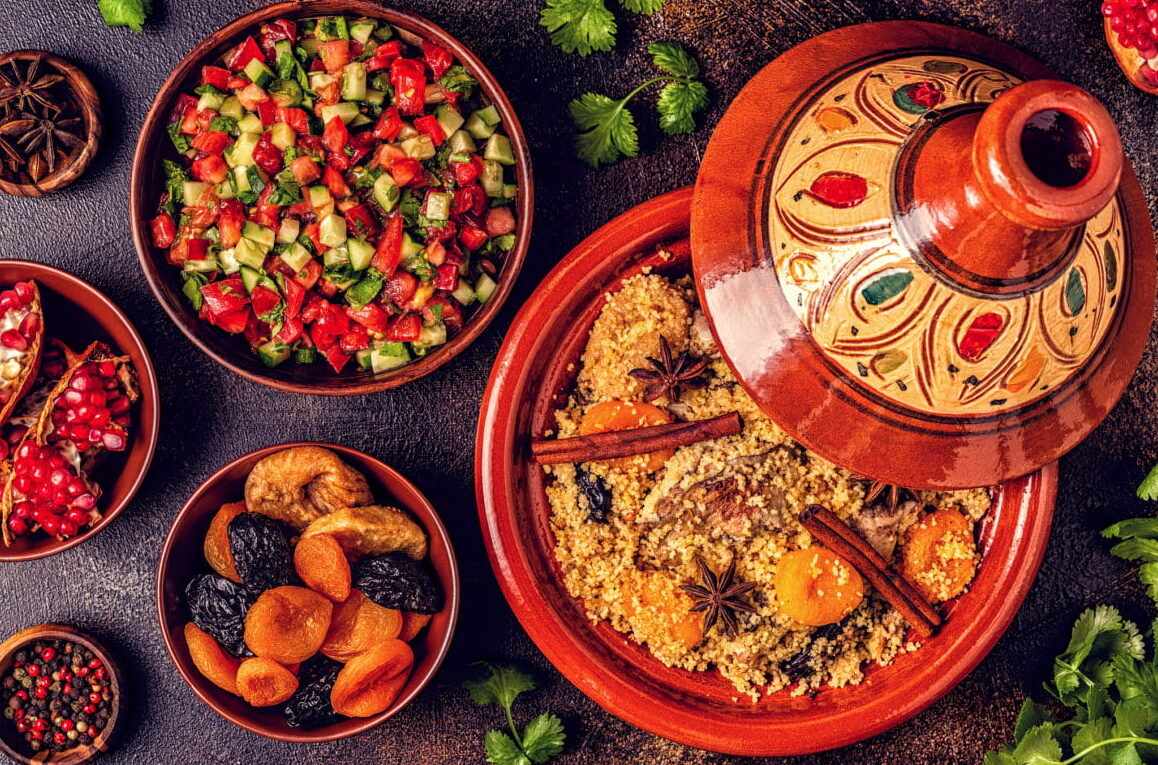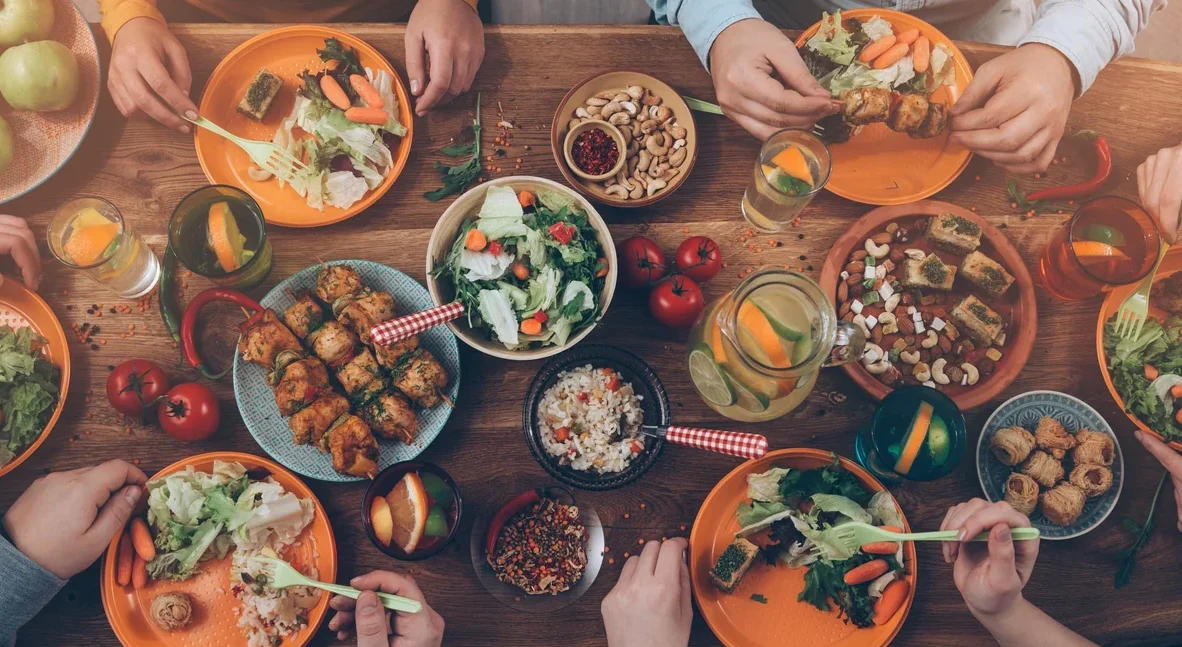
Traditional moroccan tajine of chicken with dried fruits and spices, top view.
Global cuisine refers to a style of cooking that is practiced around the world, and is defined by traditional ingredients, seasonings, and cooking practices that evolved within a particular geographic area. The origins of global cuisine are a fascinating journey that takes us across continents and cultures, exploring the diverse ways in which people prepare and enjoy their food. Food plays an essential role in different cultures, from the way it is prepared and served to the rituals and traditions surrounding it. UNESCO recognizes the importance of food culture and includes several traditional recipes in its list of Intangible Cultural Heritage, such as the Mediterranean diet and the traditional Japanese cuisine of washoku. Thus, exploring global cuisine and food culture can provide us with a deeper understanding of the world around us.
There are many popular global cuisines that have gained popularity around the world, such as Italian, Chinese, Indian, and Mexican cuisine. Each cuisine has its unique flavors, ingredients, and cooking techniques that reflect the history, geography, and culture of the region. For instance, Turkish cuisine features a variety of dishes with influences from the Ottoman Empire, such as manti, a type of dumpling. Exploring these cuisines can be an enriching experience that teaches us about different countries, customs, and traditions. Furthermore, trying cultural foods can also be a unifying force, bringing people together and promoting understanding and appreciation for different cultures.
In conclusion, global cuisine and food culture offer a rich and diverse world of flavors, ingredients, and cooking traditions to explore. From Italian pizza to Indian curries, each cuisine has its unique characteristics that reflect the history and culture of the region. By exploring global cuisine, we can gain a deeper appreciation for the diversity of the world and the role that food plays in different cultures.
Exploring the diversity of global cuisine
Global cuisine is a fascinating exploration of the diverse food cultures and culinary customs found across the world. Asian cuisine is one of the most popular and diverse types of cuisine, with a wide variety of flavors and cooking techniques. From the spicy curries of India to the savory noodles of Japan, Asian cuisine offers a unique taste experience that is both delicious and culturally rich. European cuisine is also a popular type of global cuisine, with a rich history and diverse range of flavors. Some of the most well-known European dishes include Italian pasta, French pastries, and Spanish paella. African cuisine is another type of global cuisine that offers a unique and diverse range of flavors and cooking techniques. From the spicy stews of Morocco to the savory meats of South Africa, African cuisine is a delicious and culturally rich experience that is not to be missed. By exploring the diversity of global cuisine, we can gain a deeper understanding and appreciation for the cultures and traditions that shape our world.

Asian cuisine is a diverse and complex type of cuisine that includes a wide variety of flavors, ingredients, and cooking techniques. Some of the most popular types of Asian cuisine include Chinese, Japanese, Korean, and Thai. Chinese cuisine is known for its bold flavors and use of fresh ingredients, while Japanese cuisine is known for its delicate flavors and emphasis on presentation. Korean cuisine is known for its spicy and fermented flavors, while Thai cuisine is known for its sweet, sour, and spicy flavors. Each type of Asian cuisine offers a unique taste experience that is both delicious and culturally rich.
African cuisine is a diverse and complex type of cuisine that encompasses a wide range of flavors, ingredients, and cooking techniques. From the spicy stews of Morocco to the savory meats of South Africa, African cuisine offers a unique taste experience that is both delicious and culturally rich. Traces of African food can be found in Southern cuisine, particularly Lowcountry, and in most of South America like Mexico, Brazil, and Ecuador. African cuisine is also known for its use of bold spices and herbs, such as berbere, harissa, and ras el hanout. By exploring the diversity of African cuisine, we can gain a deeper understanding and appreciation for the cultures and traditions that shape our world.
The impact of globalization on food culture
Globalization has had a significant impact on food culture, giving rise to the emergence of fusion cuisine. Fusion cuisine combines elements from various world cuisines to create unique and innovative dishes. This trend has become increasingly popular as people become more adventurous in their culinary tastes and as global travel and migration become more common. For example, Macanese cuisine is regarded as the first truly global fusion cuisine, combining Chinese and Portuguese food. This blending of flavors and cooking techniques has resulted in the creation of new and exciting dishes that reflect the diverse cultural influences of our world.
The rise of fast food culture is another aspect of globalization’s impact on food culture. With the expansion of multinational fast food chains, fast food has become a ubiquitous part of modern life. This has led to concerns about the health implications of fast food and its impact on traditional food cultures. However, fast food also reflects the fusion of different culinary traditions, as chains adapt their menus to local tastes and preferences.
Social media and technology have also played a role in shaping food culture. The widespread use of social media platforms like Instagram and Pinterest has led to the popularization of food trends and the rise of food influencers. This has also led to the democratization of food culture, as people from all over the world can share their culinary creations with a global audience. Additionally, technology has made it easier for people to access and learn about different food cultures, with online cooking classes and food blogs providing a wealth of information about traditional and fusion cuisine.





